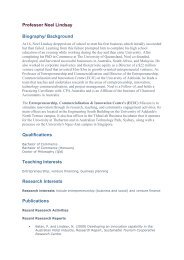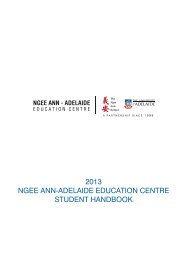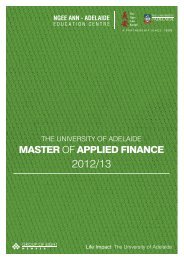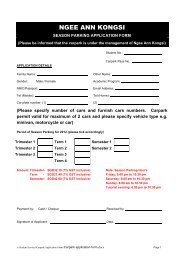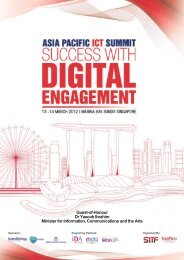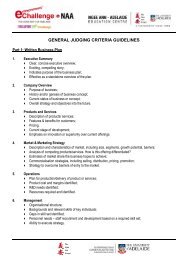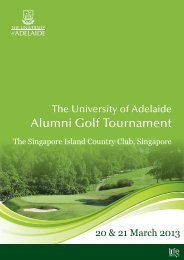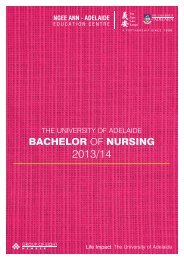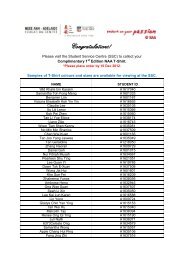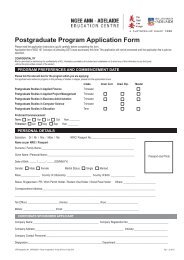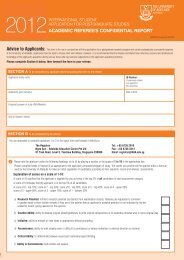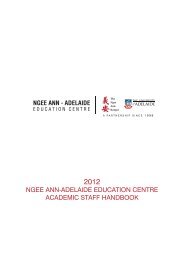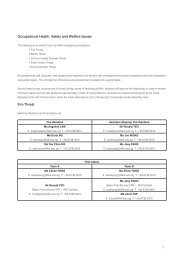bachelor of computer science - Ngee Ann-Adelaide Education ...
bachelor of computer science - Ngee Ann-Adelaide Education ...
bachelor of computer science - Ngee Ann-Adelaide Education ...
Create successful ePaper yourself
Turn your PDF publications into a flip-book with our unique Google optimized e-Paper software.
NGEE ANN - ADELAIDE<br />
EDUCATION CENTRE<br />
The<br />
<strong>Ngee</strong><br />
<strong>Ann</strong><br />
Kongsi<br />
A PARTNERSHIP SINCE 1998<br />
THE UNIVERSITY OF ADELAIDE<br />
BACHELOR OF COMPUTER SCIENCE<br />
(FINAL YEAR DEGREE)<br />
2012/13<br />
Life Impact The University <strong>of</strong> <strong>Adelaide</strong>
NGEE ANN-ADELAIDE EDUCATION CENTRE<br />
<strong>Ngee</strong> <strong>Ann</strong>-<strong>Adelaide</strong> <strong>Education</strong> Centre is the gateway to globalisation for the University <strong>of</strong> <strong>Adelaide</strong>, a University <strong>of</strong> excellence in<br />
postgraduate, undergraduate and pr<strong>of</strong>essional education. It is a partnership established since 1998 between the University <strong>of</strong><br />
<strong>Adelaide</strong> and <strong>Ngee</strong> <strong>Ann</strong> Kongsi, with the vision to educate the leaders <strong>of</strong> tomorrow.<br />
Please visit: www.NAA.edu.sg<br />
The<br />
<strong>Ngee</strong><br />
<strong>Ann</strong><br />
Kongsi<br />
<strong>Ngee</strong> <strong>Ann</strong> Kongsi is a foundation which is actively involved in<br />
educational, cultural and welfare activities. Founded in 1845 by<br />
Chinese immigrants <strong>of</strong> the Teochew dialect group, the <strong>Ngee</strong> <strong>Ann</strong><br />
Kongsi was formally incorporated in Singapore under the Ordinance<br />
Act in 1933. The Kongsi has grown from a community bound by a<br />
common heritage and genuine concern for the welfare <strong>of</strong> its<br />
members to a foundation that now serves the community regardless<br />
<strong>of</strong> race, religion or social status.<br />
With more than 130 years <strong>of</strong> excellence in education, the University <strong>of</strong><br />
<strong>Adelaide</strong> is one <strong>of</strong> Australia’s oldest and most prestigious tertiary<br />
institutions.<br />
At the heart <strong>of</strong> the University’s vision, achievement and impact is a<br />
belief that the experience <strong>of</strong> the student is fundamental, and that<br />
research and high quality teaching have a symbiotic relationship that<br />
underpins and characterises the finest universities in the world.<br />
Please visit: www.ngeeann.com.sg<br />
The University is associated with 5 Nobel Laureates, has produced<br />
106 Rhodes Scholars and 122 Fulbright Scholars, and is a member <strong>of</strong><br />
the Group <strong>of</strong> Eight - Australia’s leading research-intensive universities.<br />
Please visit: www.adelaide.edu.au and www.go8.edu.au<br />
The program is accredited by the Australian Computer Society. Graduates from this<br />
degree will be highly skilled and adaptable with the ability to design <strong>computer</strong>-based<br />
solutions to the problems <strong>of</strong> information management and processing in industry,<br />
“commerce, <strong>science</strong>, entertainment and the public sector.<br />
”<br />
Pr<strong>of</strong>essor David Suter<br />
Head, School <strong>of</strong> Computer Science, the University <strong>of</strong> <strong>Adelaide</strong><br />
SCHOOL OF<br />
COMPUTER SCIENCE<br />
Computer Science has a long history at the University <strong>of</strong> <strong>Adelaide</strong> and it is currently one <strong>of</strong> the eight Schools within the Faculty <strong>of</strong><br />
Engineering, Computer and Mathematical Sciences. It <strong>of</strong>fers high quality undergraduate degrees in Computer Science, and<br />
S<strong>of</strong>tware Engineering, and contributes to many other degree programs in mathematics, engineering and other areas.<br />
The School operates an honours program (4th year for outstanding students intending to enter research, or to gain an advanced<br />
qualification), and Masters degrees in Computer Science, S<strong>of</strong>tware Engineering, and Innovation & Commercialisation.<br />
Our degrees are accredited by the Australian Computer Society.<br />
The School has a strong research ethos and is internationally prominent in the areas <strong>of</strong> <strong>computer</strong> vision, distributed and high<br />
performance computing, evolutionary systems, formal methods, and s<strong>of</strong>tware architectures. It enjoys strong links with industry and<br />
has attracted considerable competitive research funding.<br />
www.cs.adelaide.edu.au
PROGRAM PATHWAY<br />
Bachelor <strong>of</strong> Computer Science/<br />
Graduate Diploma in Computer Science<br />
Pathway for<br />
applicants who are not <strong>of</strong>fered direct entry<br />
to the Bachelor <strong>of</strong> Computer Science/<br />
Graduate Diploma in Computer Science program<br />
Applicants who do not meet the entry requirements as stipulated by<br />
the University <strong>of</strong> <strong>Adelaide</strong> for the Bachelor <strong>of</strong> Computer Science/<br />
Graduate Diploma in Computer Science program may be<br />
recommended to undertake the Preparatory Course.<br />
Subject to their academic performance in the Preparatory Course,<br />
candidates may be <strong>of</strong>fered a place to the Final Year Bachelor <strong>of</strong><br />
Computer Science program/ Graduate Diploma in Computer Science<br />
Pathway for<br />
applicants who are <strong>of</strong>fered DIRECT ENTRY<br />
to the Bachelor <strong>of</strong> Computer Science/<br />
Graduate Diploma in Computer Science program<br />
PREPARATORY COURSE<br />
Total number <strong>of</strong> hours for the course<br />
Frequency<br />
Duration<br />
Number <strong>of</strong> modules<br />
26 hours<br />
2 sessions per week,<br />
Mon and Thurs evenings<br />
7.00 p.m. - 9.45 p.m.<br />
5 weeks<br />
4 modules<br />
Students should achieve minimum 65% grade to proceed to<br />
Bachelor <strong>of</strong> Computer Science/ Graduate Diploma in Computer Science<br />
BACHELOR OF COMPUTER SCIENCE (FINAL YEAR DEGREE) /<br />
GRADUATE DIPLOMA IN COMPUTER SCIENCE<br />
Part-Time @ <strong>Ngee</strong> <strong>Ann</strong>-<strong>Adelaide</strong> <strong>Education</strong> Centre<br />
Number <strong>of</strong> courses<br />
Bachelor <strong>of</strong> Computer Science<br />
9 - 10 Courses consisting <strong>of</strong>:<br />
1 or 2 Core Courses<br />
2 Core (Advanced) Courses<br />
1 Level Three Core Course<br />
5 Level Three Elective Courses<br />
Graduate Diploma in Computer Science<br />
8 Courses consisting <strong>of</strong>:<br />
2 Core Courses<br />
1 Core (Advanced) Course<br />
1 Level Three Core Course<br />
4 Level Three Elective Courses<br />
Duration<br />
Total number <strong>of</strong> hours for each course<br />
Intensive Teaching Block<br />
24 - 48 months<br />
32 hours – 49 hours<br />
A typical intensive teaching block is as follows:<br />
Friday: 7.00 p.m. - 10.00 p.m.<br />
Saturday: 1.00 p.m. - 6.00 p.m. or 7.00 p.m.<br />
OR<br />
Friday: 7.00 p.m. - 10.00 p.m.<br />
Saturday: 1.00 p.m. - 8.00 p.m.<br />
Sunday: 9.00 a.m. - 5.00 p.m.<br />
Students should achieve an average mark <strong>of</strong> 65% or greater for their six Level Three courses to proceed to Honours<br />
HONOURS<br />
Full-Time in <strong>Adelaide</strong> Campus<br />
Duration<br />
The Honours program is a 1 year full-time study which includes a research component.
PREPARATORY COURSE<br />
UPON COMPLETION<br />
Students who have completed this Preparatory course with the minimum grade requirement will gain entry to the Final Year Bachelor <strong>of</strong><br />
Computer Science/ Graduate Diploma in Computer Science program by the University <strong>of</strong> <strong>Adelaide</strong>.<br />
COURSE DURATION AND DELIVERY<br />
Frequency: 2 weekday evening sessions<br />
Total duration: 5 weeks<br />
INTAKE<br />
3 intakes a year: April, August, November<br />
ASSESSMENT<br />
One test per module, and one Programming Project.<br />
COURSE FEE<br />
Total Tuition Fee: S$1,200<br />
The Preparatory course fee will be used to <strong>of</strong>fset the first payment for Bachelor <strong>of</strong> Computer Science/ Graduate Diploma in Computer<br />
Science program.<br />
Fee is subjected to prevailing GST. Course fee is inclusive <strong>of</strong> course notes.<br />
4 MODULES Java Programming 1; Java Programming 2; Introduction to Discrete Mathematics; Information Encoding<br />
BACHELOR OF COMPUTER SCIENCE (FINAL YEAR DEGREE)<br />
The Bachelor <strong>of</strong> Computer Science caters for people with specific interests in <strong>computer</strong> <strong>science</strong>/information technology. It consists <strong>of</strong> a foundation<br />
<strong>of</strong> <strong>computer</strong> <strong>science</strong> and mathematics, with options in statistics, commerce and economics.<br />
This program produces highly skilled adaptable graduates who are able to design <strong>computer</strong>-based solutions to the problems <strong>of</strong> information<br />
management and processing in industry, commerce, <strong>science</strong>, entertainment and the public sector.<br />
PROFESSIONAL ACCREDITATION<br />
The Bachelor <strong>of</strong> Computer Science is accredited at the Pr<strong>of</strong>essional Level by the Australian Computer Society. It also provides the necessary<br />
academic requirements for membership <strong>of</strong> the Institute <strong>of</strong> Electrical and Electronic Engineers (IEEE) and the American-based Association for<br />
Computing Machinery (ACM).<br />
CAREERS<br />
Graduates are highly regarded by employers and have been successful in a wide variety <strong>of</strong> areas. Employment opportunities are provided in areas<br />
<strong>of</strong> administration, business data processing, <strong>computer</strong> programming, <strong>computer</strong> <strong>science</strong>, engineering design, financial s<strong>of</strong>tware, games<br />
programming, graphics programming, information technology management, internet commerce, network management and support, quality<br />
improvement, scientific data analysis, systems analysis, s<strong>of</strong>tware engineering, systems support, real-time process control and user-interface<br />
programming.<br />
CORE COURSES<br />
CORE (ADVANCED)<br />
COURSES<br />
LEVEL THREE<br />
CORE COURSE<br />
LEVEL THREE<br />
ELECTIVES (CHOOSE 5)<br />
Computer Science Concepts#; Data Structures and Algorithms<br />
Computer Systems; Mathematics for Information Technology I<br />
S<strong>of</strong>tware Engineering and Project (Graduating course)<br />
Advanced Programming Paradigms; Artificial Intelligence; Computer Architecture; Computer Networks and<br />
Applications; Distributed Systems; Event Driven Computing; Operating Systems; Programming Techniques<br />
# May be exempted.<br />
Please note that not every course will be available each trimester.<br />
GRADUATE DIPLOMA IN COMPUTER SCIENCE<br />
The Graduate Diploma in Computer Science is designed for students with little experience in Computer Science, and provides a fundamental<br />
understanding <strong>of</strong> how s<strong>of</strong>tware and hardware can be combined to overcome a range <strong>of</strong> complex challenges. Graduates will have a demonstrated<br />
ability to design and construct large s<strong>of</strong>tware systems. Employment may be sought within the information technology industry, including careers<br />
in scientific, entertainment, networking, s<strong>of</strong>tware engineering and defence sectors.<br />
PROFESSIONAL ACCREDITATION<br />
The Graduate Diploma in Computer Science is accredited at the Associate Level by the Australian Computer Society (ACS). It is designed to<br />
provide a pr<strong>of</strong>essional qualification in computing and information technology. It also provides the necessary academic requirements for<br />
membership <strong>of</strong> the Institute <strong>of</strong> Electrical and Electronic Engineers (IEEE) and the American-based Association for Computing Machinery (ACM).<br />
CAREERS<br />
Opportunities for graduates <strong>of</strong> this program can be found in academia, commercial and government sectors, defence, entertainment, <strong>computer</strong><br />
<strong>science</strong> and information technology industries.<br />
CORE COURSES<br />
CORE (ADVANCED)<br />
COURSE<br />
LEVEL THREE<br />
CORE COURSE<br />
LEVEL THREE<br />
ELECTIVES (CHOOSE 4)<br />
Computer Science Concepts; Data Structures and Algorithms<br />
Computer Systems<br />
S<strong>of</strong>tware Engineering and Project (Graduating course)<br />
Advanced Programming Paradigms; Artificial Intelligence; Computer Architecture; Computer Networks and<br />
Applications; Distributed Systems; Event Driven Computing; Operating Systems; Programming Techniques<br />
Please note that not every course will be available each trimester.
COURSE DESCRIPTIONS<br />
PREPARATORY COURSE<br />
JAVA PROGRAMMING 1<br />
This module provides an introduction to programming in Java. Topics<br />
covered include variables, control structures, number types, strings,<br />
arithmetic operators, relational operators, methods, input/output, classes<br />
and subclasses.<br />
JAVA PROGRAMMING 2<br />
This module provides an introduction to programming in Java. Topics<br />
covered include variables, control structures, array, array lists, operator<br />
precedence, exception, text files, formatted output, recursion.<br />
INTRODUCTION TO DISCRETE MATHEMATICS<br />
This module provides an introduction to discrete mathematics. Topics<br />
covered include propositional logic, truth tables, sets and its operations and<br />
functions.<br />
INFORMATION ENCODING<br />
This module introduces fundamental topics that are essential to computing. It<br />
covers topics including different number systems, its operations and<br />
conversion; and representation <strong>of</strong> numbers in <strong>computer</strong>.<br />
BACHELOR OF COMPUTER SCIENCE (FINAL YEAR DEGREE)/<br />
GRADUATE DIPLOMA IN COMPUTER SCIENCE<br />
Core Courses:<br />
COMPUTER SCIENCE CONCEPTS<br />
Programming in Java: variables, control structures,<br />
methods, classes, input/output; object orientation,<br />
interfaces, inheritance; introduction to graphical user<br />
interfaces. Introductory programming techniques in<br />
Java: recursion, artificial intelligence, finite state<br />
machines sorting and generics.<br />
DATA STRUCTURES AND ALGORITHMS<br />
Program development techniques including basic<br />
ideas <strong>of</strong> correctness and pro<strong>of</strong>; Recursion.<br />
Approaches to Problem Solving. Notion <strong>of</strong> abstract<br />
data type, representation <strong>of</strong> lists, stacks, queues,<br />
sets, trees, and hash tables. Notions <strong>of</strong> complexity<br />
and analysis;Choosing data structures.<br />
Core (Advanced) Courses:<br />
COMPUTER SYSTEMS<br />
Information storage representation, Memory<br />
organisation and hierarchy, Processor<br />
fundamentals, assembler programming, assembler<br />
operation, subroutine calling mechanisms,<br />
linking/loading, Input-output and device controllers<br />
requirements for supporting an operating system<br />
and device drivers.<br />
MATHEMATICS FOR INFORMATION<br />
TECHNOLOGY I<br />
This course provides an introduction to a number <strong>of</strong><br />
areas <strong>of</strong> discrete mathematics with wide<br />
applicability. Areas <strong>of</strong> application include: <strong>computer</strong><br />
logic, analysis <strong>of</strong> algorithms, telecommunications,<br />
gambling and public key cryptography. In addition it<br />
introduces a number <strong>of</strong> fundamental concepts<br />
which are useful in Statistics, Computer Science and<br />
further studies in Mathematics.<br />
Topics covered are: Discrete mathematics: sets,<br />
relations, logic, graphs, mathematical induction and<br />
difference equations; probability and permutations<br />
and combinations; information security and<br />
encryption: prime numbers, congruences.<br />
*Not applicable for Graduate Diploma in Computer<br />
Science<br />
Level Three Core:<br />
SOFTWARE ENGINEERING AND PROJECT<br />
This course in s<strong>of</strong>tware engineering provides an<br />
introduction to the production <strong>of</strong> high quality<br />
s<strong>of</strong>tware solutions to large tasks. Among the topics<br />
covered in this course are the following: models <strong>of</strong><br />
the s<strong>of</strong>tware life-cycle, requirements analysis and<br />
specification, program design techniques and<br />
paradigms, s<strong>of</strong>tware specification techniques,<br />
configuration management and version control,<br />
quality assurance, integration and testing, project<br />
management, risk analysis, case study <strong>of</strong> ethical<br />
considerations in S<strong>of</strong>tware Engineering.<br />
Level Three Electives:<br />
ADVANCED PROGRAMMING PARADIGMS<br />
A selection <strong>of</strong> topics from the following: Fundamental<br />
models <strong>of</strong> computation, illustrated by the lambda<br />
calculus. Different approaches to programming:<br />
functional and logic paradigms. Fundamental<br />
concepts <strong>of</strong> programming languages, including<br />
abstraction, binding, parameter passing, scope,<br />
control abstractions. Programming models<br />
expressed via Scheme: substitution model;<br />
map/reduce programming; environment model;<br />
object oriented model; a compositional<br />
programming model. Introduction to parallel<br />
computing: data parallelism, Java threads, and<br />
relationship to distributed computing. Examples in<br />
application: map/reduce programming in Google<br />
and with Hadoop; flow-oriented programming for<br />
composition <strong>of</strong> web-services. Cloud computing<br />
platforms and programming models.<br />
ARTIFICIAL INTELLIGENCE<br />
This is an introductory course on Artificial<br />
Intelligence. The topics may include: AI methodology<br />
and fundamentals; intelligent agents; search<br />
algorithms; game playing; supervised and<br />
unsupervised learning; decision tree learning; neural<br />
networks; nearest neighbour methods;<br />
dimensionality reduction; clustering; kernel<br />
machines; support vector machines; uncertainty and<br />
probability theory; probabilistic reasoning in AI;<br />
Bayesian networks; statistical learning; fuzzy logic.<br />
Several assignments will be given to enable the<br />
student to gain practical experience in using these<br />
techniques.<br />
COMPUTER ARCHITECTURE<br />
Fundamentals <strong>of</strong> <strong>computer</strong> design; quantifying cost<br />
and performance; instruction set architecture;<br />
program behaviour and measurement <strong>of</strong> instruction<br />
set use; processor datapaths and control; pipelining,<br />
handling pipeline hazards; memory hierarchies and<br />
performance; I/O devices, controllers and drivers; I/O<br />
and system performance.<br />
COMPUTER NETWORKS AND APPLICATIONS<br />
Introduction to networks and digital communications<br />
with a focus on Internet protocols: Application layer<br />
architectures (client/server, peer-to-peer) and<br />
protocols (HTTP-web, SMTP-mail, etc), Transport<br />
layer operation: (reliable transport, congestion and<br />
flow control, UDP, TCP); Network layer operation -<br />
(routing, addressing, IPv4 and IPv6), Data Link layer<br />
operation (error detection/ correction, access<br />
control, Ethernet, 802.11, PPP), Layer 2/3 protocols<br />
(ATM and MPLS); selected current topics such as:<br />
security, multimedia protocols, Quality <strong>of</strong> Service,<br />
mobility, wireless networking, emerging protocols,<br />
network management.<br />
DISTRIBUTED SYSTEMS<br />
A selection <strong>of</strong> topics from the following: the<br />
challenges faced in constructing client/ server<br />
s<strong>of</strong>tware: partial system failures, multiple address<br />
spaces, absence <strong>of</strong> a single clock, latency <strong>of</strong><br />
communication, heterogeneity, absence <strong>of</strong> a<br />
trusted operating system, system management,<br />
binding and naming. Techniques for meeting these<br />
challenges: RPC and middleware, naming and<br />
directory services, distributed transaction<br />
processing, ‘thin’ clients, data replication,<br />
cryptographic security, mobile code. Introduction to<br />
Java RMI.<br />
EVENT DRIVEN COMPUTING<br />
Event driven paradigm: Finite State Automata, their<br />
behaviour and implementation. Correspondence<br />
with regular expressions. Examples <strong>of</strong> embedded<br />
systems. Introduction to interconnected state<br />
machines, Petri Nets, and concurrency. Concepts<br />
<strong>of</strong> state-space and relationship to testing.<br />
Building Graphical User Interfaces: model view<br />
controller paradigm. Building GUIs with the Java<br />
Swing library. Ease <strong>of</strong> use and human-<strong>computer</strong><br />
interaction issues. Introduction to design patterns<br />
for managing complexity in large systems.<br />
Practical projects cover the use <strong>of</strong> FSAs for control<br />
logic and GUI design. Introduction to design<br />
patterns for managing complexity in large systems.<br />
OPERATING SYSTEMS<br />
OS purposes: resource management and the<br />
extended virtual <strong>computer</strong>; historical development.<br />
Processes: critical sections and mutual exclusion,<br />
semaphores, monitors, classical problems,<br />
deadlock; process scheduling. Input and Output:<br />
hardware and s<strong>of</strong>tware control. Memory<br />
management: multi-programming; swapping;<br />
virtual memory, paging and symbolic segmentation;<br />
File System: operations, implementation,<br />
performance. Protection mechanisms: protection<br />
domains, access lists, capability systems, principle<br />
<strong>of</strong> minimum privilege.<br />
PROGRAMMING TECHNIQUES<br />
Program development: methods <strong>of</strong> specification,<br />
design, implementations, testing and debugging,<br />
case studies, Graphs: construction, traversal,<br />
topological sorting, applications. Sorting and<br />
searching: internal and external algorithms,<br />
correctness and complexity analysis.
NGEE ANN KONGSI<br />
BOND-FREE SCHOLARSHIP<br />
is available for all undergraduate programs<br />
Terms and Conditions Apply<br />
Kelvin Yap<br />
Bachelor <strong>of</strong> Computer Science Scholar Award Recipient<br />
To strive well in the IT industry, besides experience, academic qualification<br />
is also important. We need to constantly upgrade ourselves to stay<br />
relevant. NAA's Bachelor <strong>of</strong> Computer Science program schedule is<br />
conducive to working adults like myself where classes are held over<br />
weekends. This does not clash with my work commitment and enable a<br />
more efficient time management for me.<br />
Freddie Lam<br />
completed his Bachelor <strong>of</strong> Computer Science in Singapore and<br />
was awarded a scholarship to commence the Honours program<br />
in <strong>Adelaide</strong> <strong>of</strong> which he graduated with First Class Honours<br />
The Honours project was really challenging as I had to spend the first<br />
half <strong>of</strong> the year going through research papers, trying to distill the<br />
essence <strong>of</strong> what others have done and to improve and incorporate<br />
some <strong>of</strong> my own ideas. I was fortunate to have supportive supervisors<br />
Anton van den Hengel and Anthony Dick, who listened to my possibly<br />
silly solutions and provided insights to my proposals which I found most<br />
invaluable. Their guidances had sharpened my critical thinking and<br />
analytical skill in many ways. The hard work was worth its while as the<br />
project was presented and showcased to the industries which drew<br />
strong interest. The networking with the industries was most beneficial<br />
in both contacts and work opportunities.<br />
Han Jia<br />
2010 <strong>Ngee</strong> <strong>Ann</strong>-<strong>Adelaide</strong> Scholarship Award Recipient<br />
2010 Most Outstanding Bachelor <strong>of</strong> Computer Science Student<br />
2010 S<strong>of</strong>tware Engineering & Project Course Bookprize Award Recipient<br />
I decided to embark on the Bachelor <strong>of</strong> Computer Science as I believe it will<br />
give me a new dimension on computing technology and new know-how.<br />
I opted for the program <strong>of</strong>fered by University <strong>of</strong> <strong>Adelaide</strong> at <strong>Ngee</strong> <strong>Ann</strong>-<strong>Adelaide</strong><br />
<strong>Education</strong> Centre for its study environment and intensive weekend class<br />
schedules which fit into my full-time work and social schedule. I found the<br />
courses taught in the program <strong>of</strong> strong relevance to the industry practices<br />
which I believe will help advance my pr<strong>of</strong>essional knowledge and contribute<br />
towards my pr<strong>of</strong>essional network and IT domain knowledge.
COMPLIMENTARY student membership<br />
for students <strong>of</strong> NAA enrolled in the University <strong>of</strong> <strong>Adelaide</strong>,<br />
Bachelor <strong>of</strong> Computer Science<br />
BENEFITS OF NAA STUDENT CHAPTER, SINGAPORE COMPUTER SOCIETY<br />
• Entitlement to subscribe for the annual SCS membership upon graduation<br />
at a highly subsidized rate <strong>of</strong> $40<br />
• Access to Student Chapter Microsite where students get to publicize their school<br />
events and activities<br />
• Give the students representatives opportunities to groom their leadership skills<br />
• Access to online SCS publications: • Free admission or subsidized rates for:<br />
• eNewsletter<br />
• IT Society Magazine<br />
• International Journal <strong>of</strong> IT<br />
• Site Visits to technology companies<br />
• Dedicated student social events like Movie Fiesta<br />
• Products and services <strong>of</strong> SCS<br />
14 OCT 2011<br />
LAUNCH OF NGEE ANN-ADELAIDE EDUCATION CENTRE (NAA)<br />
STUDENT CHAPTER, SINGAPORE COMPUTER SOCIETY<br />
Memorandum <strong>of</strong> Understanding Signing<br />
Ceremony and Exchange <strong>of</strong> Plaques<br />
between General Manager <strong>of</strong> NAA,<br />
Ms Lim Mei Mei and President <strong>of</strong> SCS,<br />
Mr Alphonsus Pang<br />
President <strong>of</strong> NAA IT Club,<br />
Mr Ivan Ngeow presenting<br />
his speech<br />
(L-R) Vice President <strong>of</strong> NAA IT Club, Mr Nobin Jose, President <strong>of</strong> NAA IT<br />
Club, Mr Ivan Ngeow, Chairman <strong>of</strong> SCS Student Chapter, Mr Gavin Ang,<br />
President <strong>of</strong> SCS, Mr Alphonsus Pang, General Manager <strong>of</strong> NAA,<br />
Ms Lim Mei Mei, Lecturer, University <strong>of</strong> <strong>Adelaide</strong>, Dr Cheryl Pope,<br />
Adjunct Lecturer, Mr Lim Kwang Hua, Ms Elena Yong, Ms Camilla Khaw<br />
NAA - SCS STUDENT CHAPTER<br />
OUR QUEST TO NURTURE IT LEADERS OF TOMORROW @NAA<br />
To provide a platform for students undertaking Computer Science studies to share IT<br />
best practices and to promote the spirit <strong>of</strong> innovation among the student body.<br />
We aim to provide a holistic pr<strong>of</strong>essional and academic learning experience relevant<br />
to the business industry.<br />
WHAT'S IN IT<br />
FOR YOU<br />
• Widen your network circle and meet people from diverse industries<br />
• Join in the fun-filled social and learning activities at discounted membership rates<br />
• Stay ahead at the forefront <strong>of</strong> trendsetting developments through industry news<br />
• Nurture the leadership in you through active engagement with peers and industry players<br />
COMMITTEE MEMBERS<br />
PRESIDENT<br />
Ngeow Ko-Yen Ivan<br />
VICE-PRESIDENT<br />
Nobin Jose<br />
COMMITTEE MEMBER<br />
• Tan Chun Xun Alvin<br />
• Wahono Benny<br />
• Teo Yu Lun<br />
• Sai Myo Aung<br />
• Chan Wai Kuan<br />
• Mohammed Shamshir<br />
Bin Abdul Majeed<br />
Email: ITclub@NAA.edu.sg<br />
http:// talents.naa.edu.sg<br />
Find us on:<br />
<strong>Ngee</strong> <strong>Ann</strong>-<strong>Adelaide</strong> <strong>Education</strong> Centre
Your Imagination Is The Only Limit.<br />
PRE-REQUISITE QUALIFICATION<br />
Bachelor <strong>of</strong> Computer Science (Final Year Degree)<br />
Diploma in IT related disciplines and various Engineering fields<br />
Graduate Diploma In Computer Science<br />
A university degree from a recognized university in a discipline other than<br />
Computer Science.<br />
Candidates are expected to have a background in mathematics<br />
equivalent to the standard <strong>of</strong> 'A' level mathematics.<br />
DURATION OF PROGRAM<br />
24 - 48 months<br />
INTAKE<br />
3 intakes a year: January, May, September<br />
PROGRAM STRUCTURE<br />
Bachelor <strong>of</strong> Computer Science (Final Year Degree)<br />
9 - 10 Courses consisting <strong>of</strong>:<br />
1 or 2 Core Courses<br />
2 Core (Advanced) Courses<br />
1 Level Three Core Course<br />
5 Level Three Elective Courses<br />
Graduate Diploma In Computer Science<br />
8 Courses consisting <strong>of</strong>:<br />
2 Core Courses<br />
1 Core (Advanced) Course<br />
1 Level Three Core Course<br />
4 Level Three Elective Courses<br />
ASSESSMENT<br />
Individual practical assignments, Project work, Examinations.<br />
FEES<br />
Application Fee*: S$200.00 (upon application submission)<br />
Fee Per Core Course: S$1,550<br />
Fee Per Core (Advanced) Course: S$1,550<br />
Fee Per Level Three Course: S$2,000<br />
Total Tuition Fee for BCS: S$16,650 - S$18,200<br />
Total Tuition Fee for GDCS: S$14,650<br />
The above fees are subjected to prevailing GST.<br />
Course fee is inclusive <strong>of</strong> course notes and examination fee.<br />
Course fee is charged on the basis <strong>of</strong> the number <strong>of</strong> courses enrolled in<br />
a given trimester.<br />
* Fully refundable if unsuccessful in meeting the entry requirements<br />
ENQUIRY<br />
Tel: +65 6738 2910<br />
Email: registrar@NAA.edu.sg<br />
<strong>Ngee</strong> <strong>Ann</strong>-<strong>Adelaide</strong> <strong>Education</strong> Centre<br />
97 Tank Road, Level 3 Teochew Building, Singapore 238066<br />
www.NAA.edu.sg<br />
DISCLAIMER<br />
The information contained in this publication is correct at the time <strong>of</strong> printing<br />
but may be subject to change without notice. Updates may occur - please check<br />
the website for the latest information. <strong>Ngee</strong> <strong>Ann</strong>-<strong>Adelaide</strong> <strong>Education</strong> Centre and<br />
the University <strong>of</strong> <strong>Adelaide</strong> assume no responsibility for the accuracy <strong>of</strong><br />
information provided by third parties.<br />
© The University <strong>of</strong> <strong>Adelaide</strong> 2011. CRICOS Provider Number 00123M<br />
CPE Registration No. 199703922R<br />
Period <strong>of</strong> registration: 14 Sep 2010 to 13 Sep 2014<br />
PRINT NOVEMBER 2011



